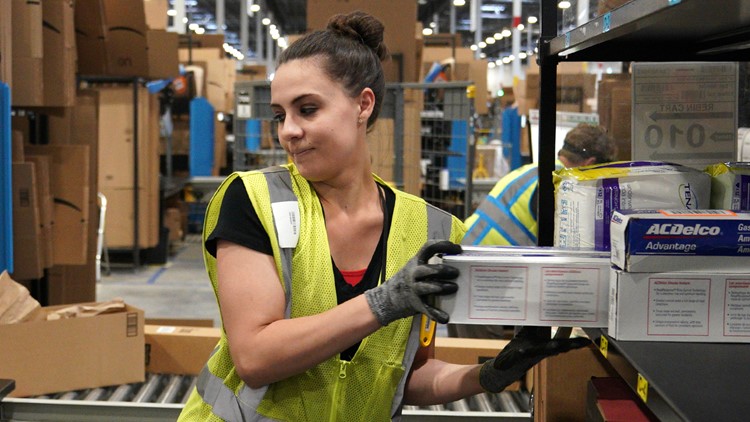SAN FRANCISCO — Amazon is making another major delivery, this time for its employees: a $15 hourly minimum wage.
The e-tailing giant said last month it would increase its minimum wage on Nov. 1 to $15 for all U.S. full-time, part-time, seasonal and temporary employees, including temps hired by agencies. That includes employees at Whole Foods, which Amazon acquired for $13.7 billion in June 2017.
Amazon currently has more than 250,000 Amazon employees, and plans to hire more than 100,000 seasonal employees this holiday season.
The company had recently been the target of criticism from Sen. Bernie Sanders, I-Vermont, who said Amazon doesn't pay its lower-level employees a fair wage.
“We listened to our critics, thought hard about what we wanted to do, and decided we want to lead,” said Amazon CEO and founder Jeff Bezos in a statement. “We’re excited about this change and encourage our competitors and other large employers to join us.”
Amazon also said it would begin lobbying for an increase in the federal minimum wage, which is currently $7.25.
“The current rate ... was set nearly a decade ago,” Jay Carney, senior vice president of Amazon Global Corporate Affairs, said in a statement. “We intend to advocate for a minimum wage increase that will have a profound impact on the lives of tens of millions of people and families across this country.”
Sanders, who introduced a bill called the Stop Bad Employers by Zeroing Out Subsidies Act (aka the Stop BEZOS Act), complimented Amazon on the move. "What Mr. Bezos has done today is not only enormously important for Amazon’s hundreds of thousands of employees, it could well be a shot heard around the world," Sanders said in a statement. "I urge corporate leaders around the country to follow Mr. Bezos lead, and I congratulate him for what he has done."
To that, Bezos responded on Twitter: "Thank you @SenSanders. We're excited about this, and also hope others will join in."
Profiting from the internet revolution
Members of Congress have railed against Amazon for paying its warehouse workers far too little as it has grown to be the world's second most valuable company and its CEO the world’s richest person.
“If you work for Amazon full time and you still can’t make ends meet, that’s a problem,” said Rep. Ro Khanna, D-California, lead House sponsor of the bill.
While it’s unclear if Amazon’s move was a direct response to the introduction of the bill, the raise means Amazon would no longer be subject to it — companies that pay at least $15 per hour or more are not affected.
Amazon has made billions by leveraging and building on the internet revolution of the past 20 years, Khanna said. “If you are profiting from changes in the economy, we need to make sure that everyone in this country has a stake in that economy.”
According to the job site Glassdoor, Amazon’s average wages at its fulfillment centers is $13 an hour. A rise to $15 is an increase of 15.4%. It represents a raise to about $30,000 a year for a full-time worker, 20% above the federal poverty level for a family of four.
“Amazon’s $15 an hour minimum wage is a sign they care about employees. (It's a) smart move to win consumers and lawmakers,” said Gene Munster, a venture capitalist at Loup Ventures and long-time tech analyst.
Earlier this year, Target increased its minimum wage for employees to $12, with plans to raise it to $15 by 2020. Walmart increased its minimum wage for employees to $11; many other companies also raised wages or gave bonuses to employees after the passage of the tax reform bill late last year.
A campaign to raise the minimum wage to $15 has been fought for in several cities and states, and Massachusetts passed a bill to hit that mark by 2023.
The minimum wage hike at Amazon comes as it is searching for a home for its second U.S. headquarters, which will employ as many as 50,000 people.
The company has a history of complaints about grueling workplace conditions and lower wages, and has had to deal with lawsuits, picketing and issues with management tactics.
In August, Sanders blasted Amazon, saying its workers were forced to rely on government programs for subsistence. "Bottom line: the taxpayers of this country should not have to subsidize employees at a company owned by Mr. Bezos, who is worth $155 billion. That is absurd," Sanders said.
The company challenged Sanders calling his accusations "misleading."
In a 2015 article in The New York Times, employees described a "soulless, dystopian" work environment of long hours and and a lack of empathy for employees' health-related issues. At the time, Bezos said the story "doesn’t describe the Amazon I know."
In a memo to employees, he promised to address the situation. "Even if it’s rare or isolated, our tolerance for any such lack of empathy needs to be zero," he wrote.
Amazon employee benefits also include healthcare coverage (including medical, dental and vision), up to 20 weeks of paid parental leave, matching 401K retirement plan, tuition assistance for courses “in high-demand fields” and other career training.
Mike Snider reported from McLean, Virginia.
Follow USA TODAY reporter Mike Snider on Twitter: @MikeSnider.
TEGNA staff contributed.



